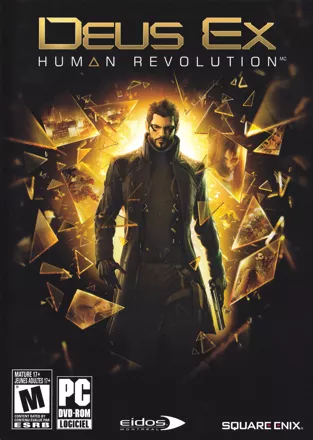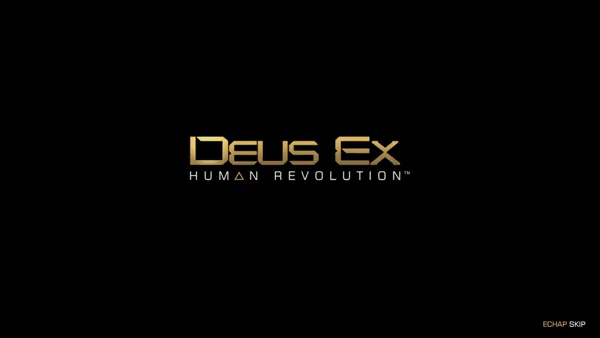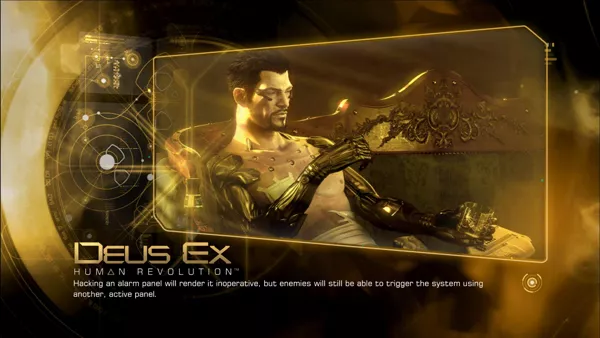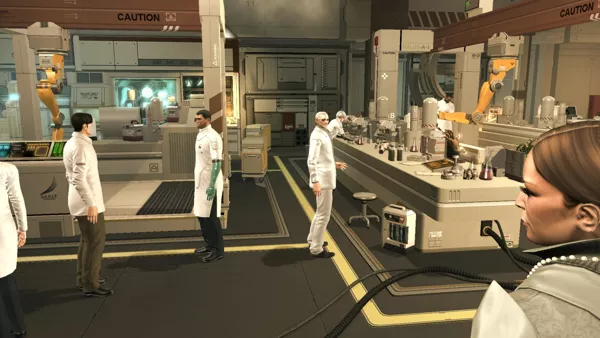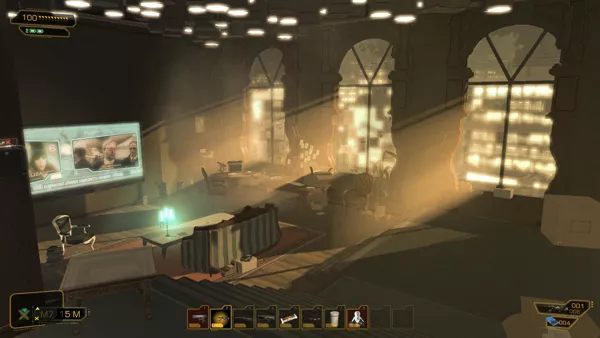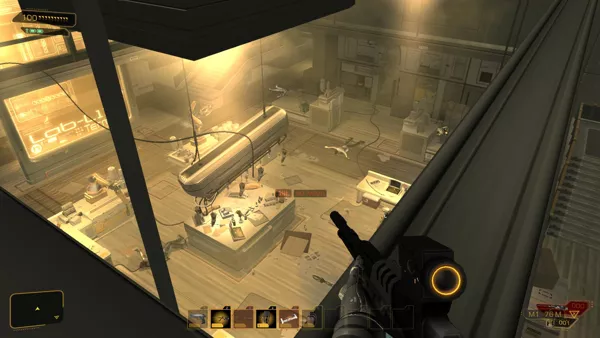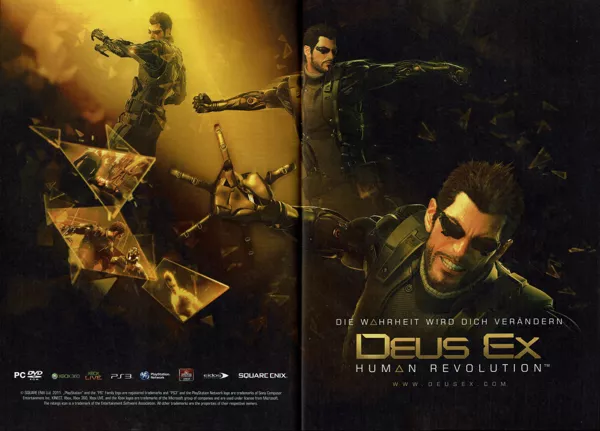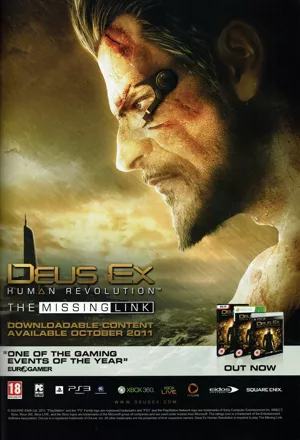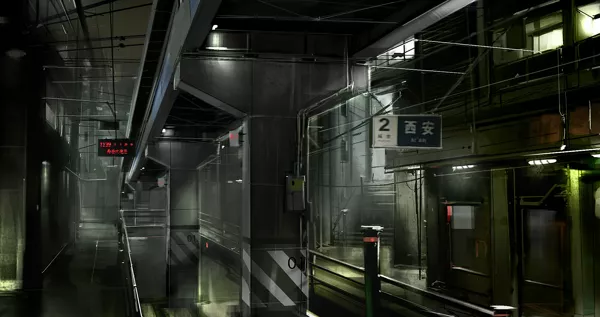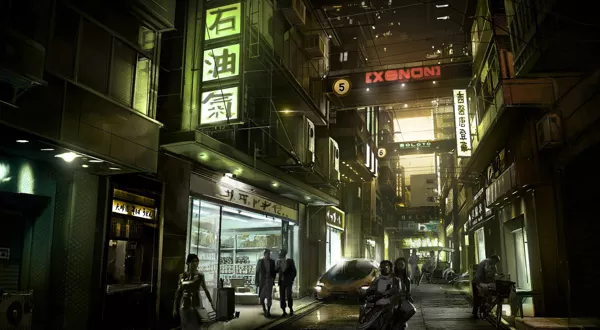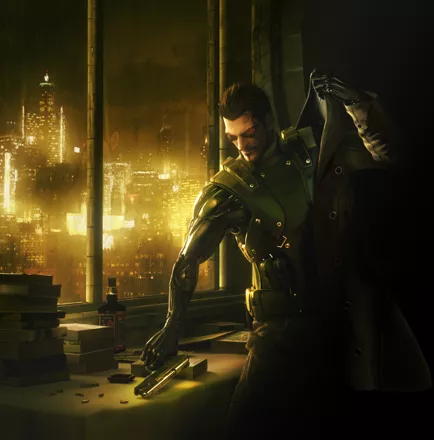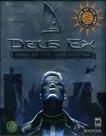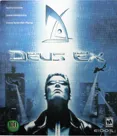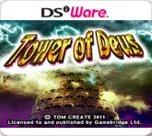Deus Ex: Human Revolution
Description official descriptions
In a near future dominated by chaos, conspiracies, and biomechanical augmentations, society is divided by various organizations fighting for supremacy, and large corporations extending their power beyond those of governments. An ideological war is growing between people who accept the biotechnological progress and people who fight it. A human revolution is coming.
Adam Jensen is a thirty-four-year-old ex-SWAT member from Detroit, enrolled by a powerful biotechnology company named Sarif Industries. His job is to ensure the scientists' private security and safeguard the secrets of the company's projects. The first day after his hiring, Adam Jensen is about to attend a meeting with David Sarif, the founder and CEO of Sarif Industries, when suddenly a red alert is issued in the company laboratories. A troop of mercenaries, apparently working for Belltower Associates, breaks in and kills several scientists. After having neutralized some of the mercenaries, Adam is severely injured by one of them. He has no choice but to be enhanced with biomechanical augmentations to save his life. His goal is now to discover what were the motivations of the attackers and unravel a greater conspiracy behind their actions.
Deus Ex: Human Revolution is the third game in the Deus Ex series. The events of the game take place in the year 2027, twenty-five years before those described in the first game. Like the first installment, the game is a hybrid of a 3D shooter with a stealth angle and role-playing. All styles of play can be adopted to succeed in the missions, from a totally furtive mode (some bonuses are granted in case the player character hasn't been detected during the whole mission) to the most brutal one. The player's decisions may have an impact on the storyline.
The game offers a vast array of weapons and biomechanical augmentations (hacking, social, stealth, sight, armor, combat skill enhancements, etc.). Various amounts of experience points are awarded for completing main or secondary quests, avoiding or eliminating enemies, hacking, reading electronic books, and discovering secret passages. After having accumulated a certain quantity of experience points, the player is awarded a "praxis kit", which can be manually used to learn or improve an augmentation. These kits can also be found during exploration or purchased in clinics.
Role-playing elements include, besides augmentations and general character-building, exploration of non-hostile areas and dialogue with non-playable characters. During certain crucial moments, the player will have to participate in a "conversation battle" with a key character, selecting the correct psychological approach and influencing subsequent plot events.
A few modifications have been made to the shooting gameplay, emphasizing its tactical aspect. The third-person cover system is integrated into otherwise fully first-person gameplay. Enemies often appear in groups led by a commander; taking out the latter may demoralize enemies, making them easier targets. Though the game still contains health-restoring items, the protagonist's health regenerates itself over time.
Spellings
- デウスエクス - Japanese spelling
Groups +
- 3D Engine: Crystal Engine
- Censored Japanese releases
- Covermount: Level (Romania)
- Deus Ex series
- Gameplay feature: Body dragging
- Gameplay feature: Character development - Skill distribution
- Gameplay feature: Grid Inventory
- Gameplay feature: Multiple endings
- Games made into books
- Games made into comics
- Games with 451
- Games with Dopefish
- Middleware: FaceFX
- Middleware: Scaleform GFx SDK
- PlayStation 3 Essentials Range releases
- Protagonist: Cyborg
- Setting: 2020s
- Setting: City - Detroit
- Setting: City - Singapore
- Software Pyramide releases
- Theme: Hacking / Pseudohacking
- Xbox 360 Classics releases
Screenshots
Promos
Videos
Add Trailer or Gameplay Video +1 point
See any errors or missing info for this game?
You can submit a correction, contribute trivia, add to a game group, add a related site or alternate title.
Credits (Windows version)
502 People (449 developers, 53 thanks) · View all
| Producer | |
| Game Director | |
| Art Director | |
| Audio Director | |
| Production Manager | |
| Animation Director | |
| Art Direction Presentation | |
| Lead Animator | |
| Technical Director Animation | |
| Animators | |
| Rigging/Skinning | |
| Additional Animation | |
| [ full credits ] | |
Reviews
Critics
Average score: 89% (based on 76 ratings)
Players
Average score: 4.1 out of 5 (based on 130 ratings with 6 reviews)
The Good
It is sad to see that Eidos jumped on the bandwagon with their flagship RPG series, and went the Bioware route. Meaning that first they kickstart an awesome, intricate, deep RPG franchise, then they proceed to ruin it to oblivion in its sequel(s) which end up being glorified First Person Shooters with mild RPG touches and very non-RPG-ish boss fights. FPS's are easier to develop and easier to market to the teen crowd, so I see the incentive. But really, what's next? Deus Ex 4: The iPhone Arcade Game? Anyway, there's still plenty to like here, so let's see:
This game is strong on atmosphere; sometimes that translates to oppressive, foreboding urban landscapes (Detroit), sometimes to exotic locales that ooze Oriental mystery and intrigue (China). Even the sterile office building interiors in this game are verisimilar and atmospheric.
Another strong point is imagination and immersion: the game dreams up a believable, fairly dystopian 2027 where we witness a widening gap between those who can afford flashy high-tech augmentations and those who cannot. The game takes its elaborate political-scientific-economic setup for granted and builds it from there, remaining very consequential and serious throughout in its depiction. No lazy shortcuts, no deal-breaking wink-wink-nudge-nudge allusions to the present day as a lesser sci-fi game would resort to. DE:HR is a mature attempt at imagining a possible, persistent 2027. In this regard, it is up there with Blade Runner's 2019 and Mass Effect's 2183.
As a consequence of the above, all the dialogs and the characters are very good, almost too good for an action RPG. Sarif is my favorite example: a charismatic, enigmatic leader and a love-hate father figure to our hero, he always has another revelation or two up his sleeve. The conversations in general are multi-layered, eloquent, emotionally mature and unpredictable. They should be good, as they are written by novelist James Swallow and veteran lead writer Mary DeMarle.
On a more technical note, this game has the best cover system I've experienced in an FPS/3PS yet. It's practical, very useful and easy to master. It's even great to look at: whenever Adam leans next to a wall in his aug-sunglasses, silenced gun in hand, and an enemy guard approaches from around the corner (as it occurs dozens of times in the game), it looks just like a shot from some cool sci-fi comics. As far as cover systems go, I hope future action games look at DE:HR and take it from there.
The Bad
This is an FPS. Granted, this is an FPS that can be optionally played as a survival stealth game. Yet it was marketed as an RPG. If it walks like a duck and quacks... you know the rest.
The game actually becomes unapologetic in its FPS-ness by the second half. The focus shifts to sneaking, evading turrets and upgrading your weaponry so you finally have a chance against Jamar and Zhao, the last two bosses.
Oh yes, don't get me started on the boss fights. These are the equivalent of Eidos's ultimate testimony that they WERE thinking on FPS terms with this game.
Then there is the problem of repetitiveness in the second half, again a typical FPS trait.
The Montreal stage is a seemingly endless array of boring office rooms and vent ducts.
Much of the Singapore stage is, surprise, a seemingly endless array of boring office rooms and vent ducts.
The following Panchaea stage, however, is quite brilliant, as if the project leader finally burst out: "Guys, we need to end this one with a bang! No more office rooms and vent ducts, use your head! This is s'posed to be a Deus Ex game!"
It ended up as an odd out-of-place homage to Half Life 1 (and even to Left4Dead), but I loved it.
The Bottom Line
When taken at face value and not as the latest entry of a venerable RPG franchise, DE:HR proves to be a very playable FPS with some RPG elements, in fact it stands out as probably the best of its kind this year. It's much longer and more interesting than other 2011 FPS/3PS titles I've played. Problems arise when we realize that it's supposed to be a full-blooded prequel to Deus Ex. THE Deus Ex. The fact is, Eidos went the safest, trendiest route here and tried to appease both contemporary fan camps: the newer generation of hardcore action afficionados (who were reared on Quake 3 and Half Life 2) and the older generation of actual Deus Ex fans. As Mass Effect 2 and Dragon Age 2 have proved just before DE:HR, you can't have the best of both worlds in RPG gaming: you either go "deep, hardcore RPG" or you're lite and flawed. Deus Ex has just joined the club of flawed game franchises.
And yet Deus Ex: Human Revolution excels in one aspect: give me its memorable vision of a 2027 Shanghai any day.
Windows · by András Gregorik (59) · 2011
The Good
What I liked most about Human Revolution is how the developers exercised a good deal of moderation in dumbing it down. For example, they introduced regenerating health, which is normally considered a dumb feature, but they also made the weapon damage high and the regeneration slow, thus negating some of the dumbness. They removed skills, but deepened augmentations. And so on... Overall it's nowhere near the disaster Oblivion or BioShock were.
In some ways, it's better than the first Deus Ex. The dialogues are deeper, and there seem to be more choices and consequences (I only finished it once), the graphics are of course a lot more detailed, and the engine renders the atmospheric environments well. I liked it a lot better than the shiny Unreal3 look from other contemporary games. Performance is fine too (at least on DX9.)
Aesthetically, it's quite pleasing. The Detroit area is the weakest. The other hub has some beautiful environments, and the missions have their striking moments too (except a certain dock mission, which is both visually boring and poorly motivated).
The side quests are interesting. Most of them somehow tie into the augmentation debate - the brainwashed mercenary-assassin who starts killing his employers, the prostitutes who are forced into augmentations to enhance their clients' pleasure (yikes), etc. They are comparable or better than anything the original had to offer.
The Bad
What bothered me the most was that they changed the gray, realistic visuals from Deus Ex into something that reminds me more of cyberpunk anime, which makes it lose some of its impact. For example when a character talks about private security forces as 'capitalism's final encroachment into one of the most lucrative industries' it's actually quite a deep thought that's relevant to our modern world, but because it's said by a cartoonish character in a cartoonish world, it will hardly register.
Then there are the three unavoidable boss fights that happen in small rooms and can only be defeated by shooting them long enough (and it does take a long time). I don't know why they put these in. Deus Ex is about being sneaky and clever. It's not about shooting a tank-like character in the face fifty times while dodging infinite bullets and grenades. It's almost like fighting bosses in a platformer.
Then there's the small stuff, like the third person cover and take-down mechanics, the much more game-y interface, the use of a quest compass (which is useful, but only because the map is so useless), lack of detailed locational damage, skills, lockpicks, etc.
The main storyline events are really dumb. For example, at one point, you have to figure out a freighter's destination. Well, we're the head of security of a mega-corporation in a cyberpunk setting, so how will we approach this? Will we attach a tracking chip to the ship? Will we watch it from orbit? From a plane? No? A boat then? How about hacking a computer for the schedule, or interrogating a dock worker with our arm blades? Nope, hobo Jensen decides he's going to hide in a cargo container to see where it's going.
The Bottom Line
It's... okay. It's better than Deus Ex in some ways and worse then Deus Ex in some ways. In most ways it's the same - and that's the problem. It's been ten years since DX1 came out, and one expects a certain amount of progress and increase in depth which Human Revolution hasn't delivered. It could've been more open, the world could've been more reactive, it could've partly simulated an economy and ecology, whatever. It could've been different, but instead it is too much of the same.
Windows · by dorian grey (243) · 2011
The Good
The story and characters are top notch.
Hacking involves a fun mini-game.
Above-average voice-acting.
The Bad
Too much reading to get any context.
Gameplay is not as enjoyable as previous entries.
Unimpressive visuals.
No lock-picking!!!
Level-design straight from the Doom mapmaker.
The Bottom Line
Story:
The plot in Deus Ex: Human Revolution is centered around a moral question, which it explores from all possible angles. The question is “should humanity control its own evolution” and it’s an issue that we might have to deal with ourselves very soon. People can already replace parts of their body with artificial ones, but how long will it take before we can not only replace, but also improve?
At the start of the game we are in an office and we learn about Sarif Industries. The protagonist is Adam Jensen, a security officer for the corporation and a very regular person. The company is about to present the latest developments in technology to a congress when augmented mercenaries attack the building and destroy most of it, including Adam. The character is restored over the course of six months, which involves implanting a number of mechanical parts in his body. When Adam returns he is send out to discover what happened to the science team and how to get their company back on track.
The plot itself is rather intriguing and the pace is very fantastic, so you are constantly discovering new secrets and plot-threads as you play. Each character you meet is also fairly interesting and has his or her own ideas about the main question that hovers over the story. What makes this work, though, is that the game never forces an opinion on you and instead allows you to come to your own conclusions. It could be used to indoctrinate the audience, but instead serves as an informative tool that presents us with a very plausible future. There were a few moments where the game felt a little too much like Syndicate to me (i.e. having me run errands for a global corporation), but it will definitely keep you interested more than the sometimes easily-distracted original Deus Ex.
Gameplay:
The main feature of the franchise has always been the premise of been able to resolve each issue in different ways, the core mechanics been sneaking, hacking and fighting. If you need to get inside a building, for example, then it’s possible to do so by killing soldiers for a key, hacking the terminal next to the door or finding a secret entrance. This means that you can freely invest in any set of skills and never truly get stuck on anything, but I do fear that this entry misses the point somewhat. While moving through the levels, the old formula applies perfectly, but a number of boss-fights will instantly force you into fighting. The original would also contain boss-fights, but it was easily possible to sneak past most of them, run away or even persuade them into becoming friendly. No such luck this time around.
Combat itself is about what you’d expect from a decent first-person shooter and thus not terribly interesting. Each weapon can be upgraded with certain kits, though, so you can make some really overpowered toys for yourself. Sneaking is largely cover-based and functions by holding the right mouse-button when close to any kind of wall, from this position you can then poke your head out for some tactical overview, move around and even roll to cover distances between walls. There is however a lack of execution moves that you can perform from in cover, so in order to get rid of approaching guards, you’ll have to kneel down manually and hope the random AI doesn’t detect you too early. Hacking is done with a little mini-game that has you making your way through a network by capturing virtual nodes. I found this to be the most interesting approach, since there are extras to pick up and it can be really challenging when you are detected too early and quickly need to capture the right points.
On the more negative side, lock-picking has been removed entirely, as well the spy drone and some other features. Instead of the very limited and focused set of skills you would get in the original, you know get to choose any upgrade after each level up or by finding special items. This is such a fast progress that you’ll pretty much end up been able to handle any situation in every way, which makes it both less challenging and less worthwhile. It’s also a slow process to clear out an area, hack every stupid computer, move through every vent and then finish you’re actual mission just to get all the upgrade points. There was a point at which I just stopped upgrading because I had almost everything that was useful already; this point was two hours before the final mission even started.
Presentation:
This part of the game left me rather stumped, because I now feel like I am completely missing out on something. People have called this game beautiful and stunning, but all I see is a decently looking modern game that occasionally pisses itself. The focus on yellow is somewhat interesting, but often the game uses blocky imagery (probably on purpose), which is severely out-of-place in an otherwise realistic game. During some conversations with female characters, the upper-body also seemed unfinished. I did enjoy the fact that Jensen always wears sunglasses in order to display the HUD, it’s a simple touch, but it fit the game well and made for some entertaining scenes where his sensors got jammed.
Voice-acting has always been a big miss with the franchise, but this one pulls it off relatively well. Actors give another layer of personality to the characters they are voicing and put in genuine effort to make even the smaller characters come to life. Adam himself is a bit of a boring twat, though, which neatly resembles the level-design. Each area is made through a checklist, which makes sure each section has enough chest-high walls surrounding the flanks and a few vents that lead the player around enemies. The presentation is shaky at best and aggravating at worst.
End-game content:
Deus Ex is typically a game that simply ends after the last mission, but this one has some points that make it worth replaying. For one: it’s entertaining to see how different choices throughout the game can change the dialogue and events you run into. Some choices also ascend past the binary “good” or “bad” choices, which fits well with the game’s focus on morality. That doesn’t mean I didn't instantly uninstall the game after finishing it once, though, so replays are optional for the die-hard fans and financially weak.
Verdict:
You play Human Revolution for the story and atmosphere, but the lacking gameplay does show up a little too often. A lot of players will find themselves getting stuck on bosses even when playing on Easy, which goes directly against the premise of the game. If you can find this game on sale or at about 15 euros/20 dollars, then it’s worth a purchase for the plotline alone. Veterans of the franchise will probably feel a little betrayed, though.
Windows · by Asinine (956) · 2013
Discussion
| Subject | By | Date |
|---|---|---|
| Slipcase | Fred VT (25942) | Feb 18, 2014 |
| Habemus Missingm Linkem! | Slug Camargo (583) | Oct 18, 2011 |
| Guess what was outsourced? | Patrick Bregger (304624) | Oct 9, 2011 |
| First impressions | Unicorn Lynx (181746) | Sep 18, 2011 |
Trivia
1001 Video Games
Deus Ex: Human Revolution appears in the book 1001 Video Games You Must Play Before You Die by General Editor Tony Mott.
References to other games
In Frank Pritchard's office in Sarif Industries there is a poster on the wall with some character art and a title: Final Fantasy XXVII. Considering the fact that the events of Deus Ex: Human Revolution take place in 2027, this prognosis for a future installment in the Final Fantasy series (published by the same company) means that during the 16 years between 2011 and 2027 there will be 13 new Final Fantasy games released.
References to real life
During the arrival cutscene in Montreal, you see Picus Headquarters. The building for Picus Headquarters is modeled after the real-life Olympic Stadium in Montreal. In addition, at a certain point during the level, you overhear a couple of guards talking about the history of the building. They mention how during a concert, a concrete slab fell and crushed concertgoers. While thankfully that never happened in real life, it's a reference to various incidents involving pieces of the concrete structure in Olympic Stadium coming loose and falling off.
References to the game
Deus Ex: Human Revolution was parodied in an episode of "Die Redaktion" (The Editorial Team), a monthly comedy video produced by the German gaming magazine GameStar. It was published on the DVD of issue 10/2011.
Region lock
In August 2011, it was announced that the UK and Russian versions would be region locked. This stirred quite the controversy and after protests the region lock for UK was removed.
Awards
- GamePro (Germany)
- 2011 - #2 Console Action Game of the Year (Readers' Vote)
- PC Games (Germany)
- Issue 01/2012 - #2 Best Game in 2011 (Editors' Choice)
- Issue 01/2012 - #3 Best RPG in 2011 (Readers' Choice)
- Issue 01/2012 - #5 Surprise in 2011 (Readers' Choice)
Analytics
Upgrade to MobyPro to view research rankings!
Related Sites +
-
Deus Ex: Human Revolution at eidos.com
Game page on publisher's website (Multilingual) -
IGCD Internet Game Cars Database
Game page on IGCD, a database that tries to archive vehicles found in video games. -
Sarif Industries
Fictive website of Sarif Industries, the protagonist's employee (Multilingual)
Identifiers +
Contribute
Are you familiar with this game? Help document and preserve this entry in video game history! If your contribution is approved, you will earn points and be credited as a contributor.
Contributors to this Entry
Game added by Tao_.
OnLive added by firefang9212. PlayStation Now added by Sciere. Xbox One added by MAT.
Additional contributors: Unicorn Lynx, JRK, CaptainCanuck, Fred VT, Patrick Bregger, Victor Vance, joicrawu.
Game added August 26, 2011. Last modified May 24, 2024.
